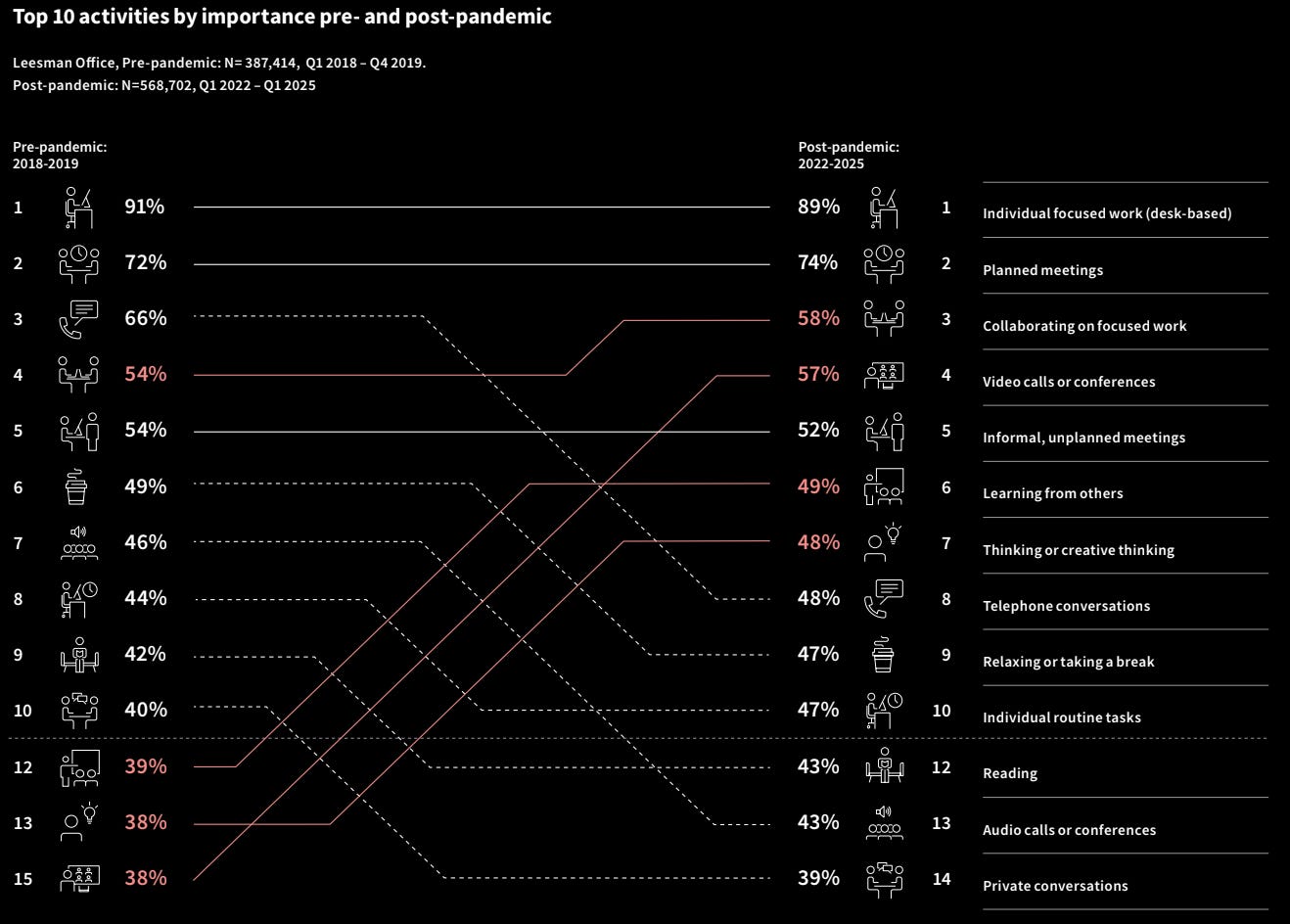We need to adapt to the new rhythms of work
ALSO: half of young people are 'numb' to their company culture
I’ve always found the research published by Leesman to be some of the most valuable insight to help us to decode the evolving workplace. (Here’s some of my comments on their work in the past: here, here and here). Leesman say their mission is simple: ‘to help create better places to work’.
They started by discussing the commute. The idea of evaluating the benefit of the commute would have seemed heretical five years ago. It wasn’t up for debate whether you saw getting into town as worthwhile, today some of us have a choice whether to head in. As someone reminded me last week, the return train from Croydon to London is now £15.30. Is sitting alone on Teams calls worth £15 plus a sandwich?
The unspoken issue is that commute lengths have increased across the board. Leesman say 27% of workers have a one way commute of 30 mins or less. An additional 48% have between 30 minutes and an hour’s journey to get to work. But for the remaining 25% have over an hour (with 4% having over 2 hours each way).
Unsurprisingly the longer the journey, the more we prefer to work at home. Just 35% of those who travel over 2 hours are satisfied with what the office offers them.
(51% of Brits and Americans report being satisfied with their commute, compared to 71% for Europe and 66% for Asia). Interestingly satisfaction with commuting is highest for those who cycle (89%), run or walk (88%) to work.
Leesman’s conclusion is that the commute ‘sets the tone for the day’ and should be seen as part of the workplace experience. Employers should think about improving the commute - maybe by incentivising cycling or allowing staggered start times. Anything that makes the commute better makes the job seem better.
When it comes to presence younger workers do indeed report being in the office more. ‘Nearly half (47%) of employees under 25 are in the office more than three days a week’, a stark contrast to the 28% of over 55s - an issue that raises questions about mentoring and passing on knowledge. Leesman report that the higher the office attendance rate, the higher the satisfaction with the office. (Multiple interpretations of this, of course).
While workers with their own dedicated workstation are happier (happiness index of 74.3) than those who have to pre-book a desk (69.3) or who wander the halls looking for a space (69.1), in fact a bigger contributor to happiness is whether there’s a range of working environments when we get to the office. (This was a big theme of Leesman’s last research)
It was the rhythms of working that was the most interesting. The most important perceived role of the office remains the same - to get individual focused work completed. (89% said this) followed by planned meetings (74%) and collaboration on focus work (58%). Despite some organisations declaring the office is now a place for experiences, for most of us it isn’t just a place of coming together, we also want to do our day jobs while we’re there.
So what’s the ‘so what’ on all of this?
We can’t ignore the commute, it’s part of the office experience and we need to make it better (I’d love to hear from any firms who pay for workers’ commute)
Offices don’t need to be louder, they need to be elite for focus work (alone and with others)
Young workers are showing they’re willing to come into the office, we need to deliver mentoring and learning for them to reward their faith
If you want to hear more Leesman are running a webinar version of their insight next month - sign up to attend or to receive their research deck.
Thanks to Deliveroo for Work for sponsoring this week’s Make Work Better
Ignore the zone full of AI slop: Steve Bannon’s infamous strategy for beating off press criticism is to ‘flood the zone with shit’. People switch off when too many stories are hitting them from too many angles, they feel overwhelmed and dial down their news consumption. Anyway, staying interested in AI is becoming like that. But here’s two things that you should be aware of. Firstly Ethan Mollick covers the breakthrough evaluation of AI agents released last week which found that AI is now equal to human experts on complex tasks:
Industry experts were asked to do blind assessments of work projects completed by either AI or humans. The projects took the form of common tasks in different sectors (‘from finance to law to retail’). The tasks would take humans between 4 and 7 hours to complete, the AI of course completed them in seconds. (It’s worth taking a look at the tasks here). The experts were asked to assess who did a better job, not knowing which assignments had been completed by humans or AI agents. The humans won the competition, but by a whisker. The conclusion has been that we’re close to AI being able to do expert level work on specific projects. With guidance of course, but hours of work in minutes, if guided by a human
Secondly Derek Thompson weighs in on whether this will lead to AI stealing our jobs - he concludes that Jevon’s Paradox says it won’t. Jevon’s Paradox is the observed phenomenon where increased efficiency leads to more consumption rather than less. Make sure you drop an off-hand reference to Jevon’s Paradox in your catch up with your boss this week
Generation Numb: almost half of all employees feel ‘numb, indifferent or nothing’ towards their company culture according to a new report from training group, Sponge. The report suggests that this numbness is a barrier to performance and recommends taking the approach of building individual connection inside organisations to repersonalise the experience of work
Good LinkedIn post about how many start-ups are baking workplace agility into their model - starting with co-working and dialling it up or down based on usage. I gave my perspective here, what do you think?
One of my favourite reads of this year was Brian Eno’s book on art. He says children learn through play and adults play through art. He’s been talking about these themes for a decade and they get better every year as he evolves them. I loved the book but Eno talking about it is even more compelling. Do yourself a favour and check this out while you make a meal one night this week
The Zach Mercurio podcast about mattering has been the biggest episode of the year, he’s doing a free webinar with HBR
The idea that tech billionaires are going to gift us a minimum basic income in the future is hilarious. Here’s LinkedIn founder Reid Hoffman saying that wanting work-life balance is a red flag that you’re ‘not committed to winning’
RTO mandates are caused by middle aged men not getting the respect they want from their families
A mention of the last podcast, a discussion with the brilliant Nick Shackleton-Jones.
Anyone who uses TikTok may have come across the witty rants of Nick (I included my favourite one in last week’s newsletter) dismantling the futility of bureaucracy, giving coping strategies for neurodiversity and venturing into philosophy. I chatted to him to hear more. Nick posts brilliantly witty rants on TikTok that are just the best things I hear about work and the futility of bureaucracy.
TikTok is a fame machine and if creators drop a banger they can end up reaching a vast audience. Nick has posted some content about work, neurodiversity and philosophy that has had millions of views.
Great listen. If you don’t use TikTok then I’ve given a selection of his best posts below:
Nick on LinkedIn / Shackleton Consulting
The pick of Nick’s posts to check out:
More of what he misses about corporate (on company values)







My - admittedly slightly radical - idea on commute is: Make it part of working hours. If me being in the office five days a week is so valuable for my employer, then put your money where your mouth is. I am not commuting because I like a stuffed train, but because it's mandated by the employer - and I am likely to do email or reading industry news anyway while commuting. Sure, you can set some guardrails such as up to one hour / day of commute can be put against your working hours but such a policy would at least focus the debate on the value of being in the office versus "I feel it's better for our culture".
Thank you for your thought-provoking post. I think there may be an additional aspect that we often ignore, which is the ecosystem within which the office exists. Not sure it's just about the length of commute and the reliability and often unpleasantness of it. I think there's something about the environment in which the office location sits. Whether it's a business park, or a London suburb, or even London centre, the cultures are often sterile. They often reek of performance mentality and little of the humanity we look for outside of that. I think today's Gaping Void post made a very valid observation.
https://mailchi.mp/gapingvoid/infinite-game-or-bottomless-pit-2769567?e=22bfe218ef